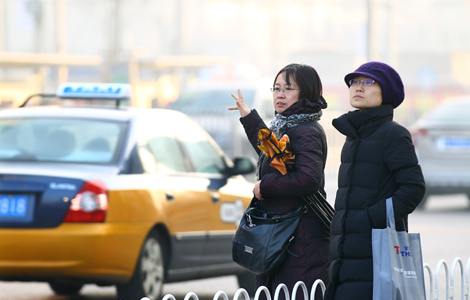An era of great expectations
Updated: 2013-01-22 04:13
By Chen Weihua in Washington (China Daily)
|
||||||||
A president at the beginning of a second term in the White House is in need of a legacy and expectations are running high for improved relations after US President Barack Obama was sworn in for another four years.
Obama was officially inaugurated at a White House ceremony on Sunday as the US Constitution requires that the president be sworn in by Jan 20. A public ceremony will be held on Monday.
Leaders of both China and the US have already defined their ties as the most important relationship of the century. After a bruising presidential campaign, characterized by China bashing by both political parties, recent months have seen a cooling of rhetoric.
When Obama met with Premier Wen Jiabao in November, the US president described the relationship as "cooperative and constructive''.
Party chief Xi Jinping told former US president Jimmy Carter last month that both countries should build a partnership based on respect.
Despite media attempts to hype intense rivalry between the two countries, Jeffrey Bader, a senior fellow at the Brookings Institution and a former senior director for East Asia affairs in Obama's National Security Council, said ties have been quite good.
The two leading economies in the world have become each other's second-largest trade partners, with bilateral trade approaching $500 billion.
China is one of the fastest-growing markets for US exports and the biggest market for US farm products. Even Apple CEO Tim Cook predicted a week ago that China will replace the US as the company's largest market.
Meanwhile, the number of Chinese students at US colleges and universities has reached a record high of 194,000, a 23 percent increase from a year ago, while the US has embarked on a 100,000-strong initiative to send US students to study in China.
The countries have become so interdependent that Larry Summers, the former treasury secretary and economic adviser to Obama, said he could picture a 21st century in which the US and China prosper and he could picture a 21st century in which the US and China do not prosper, but he could not picture a 21st century in which one of the two prospered and the other did not.
Obama was the first US president to visit China during his first year in office, in 2009, and President Hu Jintao and Vice-President Xi Jinping both visited the US in the last two years.
China and the US have also worked together over the last year on a host of global issues.
"I see the relationship as in pretty good shape. I don't see a downward spiral or the rising confrontation that I read about frequently in the media and in commentaries, both in the United States and in China," Bader told a conference in Beijing two months ago.
Bader said that while he may be a person who sees the glass as half full, he is not unaware of public concerns, including tension arising from maritime disputes.
While Washington denies that the US pivot, or rebalancing, to Asia is aimed at containing China, many Chinese people remain deeply skeptical.
Zha Daojiong, a professor of international relations at Peking University, believes the US is biased in favor of Japan concerning the Diaoyu Islands.
That sentiment is also strong among many Chinese citizens especially after US leaders stressed that the islands in the East China Sea were covered by the US-Japan security and defense treaty.
The rapid growth of US arms sales in Asia and its aggressive push for the Trans-Pacific Partnership, a trade bloc that excludes China, fuels concerns over the US regional role.
The pivot to Asia has also sparked heated debate within the US.
In an open letter to the president on Thursday, Kenneth Lieberthal, a senior fellow at the Brookings Institution and a China specialist, suggested that Obama could improve relations with China during his second term by amending the rebalancing strategy.
According to Lieberthal, the strategy is generating dynamics that increasingly threaten to undermine its primary goals.
"It is therefore time to rebalance judiciously the rebalancing strategy, and China's leadership change provides you with an opportunity to do so," Lieberthal said.
Lieberthal believes the relationship has gone in the wrong direction and distrust has grown since the pivot to Asia started less than two years ago.
In his policy recommendation to Obama, Lieberthal said that nobody in Asia wants to have to take sides between the US and China. "All seek 'wise management' of US-China relations. An initiative that improves US-China relations and contributes to regional stability can, therefore, potentially enhance the US position throughout Asia," he said.
Lieberthal and Wang Jisi, a professor of international studies at Peking University, co-authored a paper last year on reducing the strategic distrust between the two countries.
That would "improve the potential for a long-term normal major power relationship between the US and China, rather than an adversarial relationship that might otherwise develop."
Donald Gross, a senior associate at the Pacific Forum Center for Strategic and International Studies suggested that Obama should seize the opportunity created by the emergence of China's new leadership to stabilize relations by pursuing a diplomatic strategy that, among other things, significantly expands trade.
He said the US should keep in mind the profound words of former national security advisor Zbigniew Brzezinski.
"If the US and China can accommodate each other on a broad range of issues, the prospects for stability in Asia will be greatly increased ... the US must recognize that stability in Asia can no longer be imposed by ... the direct application of US military power. Indeed, US efforts to buttress Asian stability could prove self-defeating, propelling Washington into a costly repeat of its recent wars, potentially even resulting in a replay of the tragic events of Europe in the 20th century."
Chinese pundits also placed high hopes on Obama's second term. Jia Xiudong, a senior researcher at the China Institute of International Studies, believes a lot of issues between China and the US were exaggerated during the presidential election.
"This year should be a good opportunity to improve the relationship," Jia said.
He also hopes the US lifts exports controls on China and respects China's core interests.
US arms sales to Taiwan and US presidents meeting the Dalai Lama have increasingly triggered outrage in China.
Despite differences, Brzezinski believes that China and the US have managed their differences well.
"My sense is that at least those who shape policies in both countries now realize there is a kind of de facto partnership between China and America," he said.
"That is not a bad conclusion to reach in a very complicated relationship between two countries as different as one can imagine," Brzezinski told Fareed Zakaria on CNN.
Bader believes there is optimism for a smooth relationship from China's new leadership.
He recalled a meeting between him, former secretary of state Madeline Albright, and former president Jiang Zemin in 1997, in which Jiang said that when he first became general secretary, Deng Xiaoping had told him, "you are responsible for China-US relations''.
Deng and Jiang clearly viewed the relationship as one of the essential responsibilities of the leader of the party, Bader said. He said President Hu Jintao also took responsibility for the relationship.
"I expect nothing less from Xi," said Bader.
Obama's nomination of two key cabinet members, John Kerry as secretary of state and Chuck Hagel as secretary of defense are positive developments, analysts believe. Both have supported greater cooperation .
"The simple fact is that we need China, and China needs us,'' said Kerry, who is widely expected to be approved in a Senate hearing on Friday.
"We have to get this relationship right. After all, we are talking about our connection to one-sixth of humanity. The most serious problems we face today, from nuclear proliferation to climate change, can't be solved alone. And, economically, our futures are deeply intertwined and will remain so."
Kerry also criticized the tendency to demonize China and to consider it the next great threat. This viewpoint is not based on reality, he said.
Hagel chairs the Atlantic Council and it issued a recent report saying that US strategy to 2030 must deepen cooperation with China.
The report suggested that the US strategy should accommodate legitimate, essential Chinese interests just as China will need to make reciprocal adjustments in regard to US essential interests.
Cheng Guangjin and Pu Zhendong contributed to this story.
Contact the writer at chenweihua@chinadaily.com.cn











